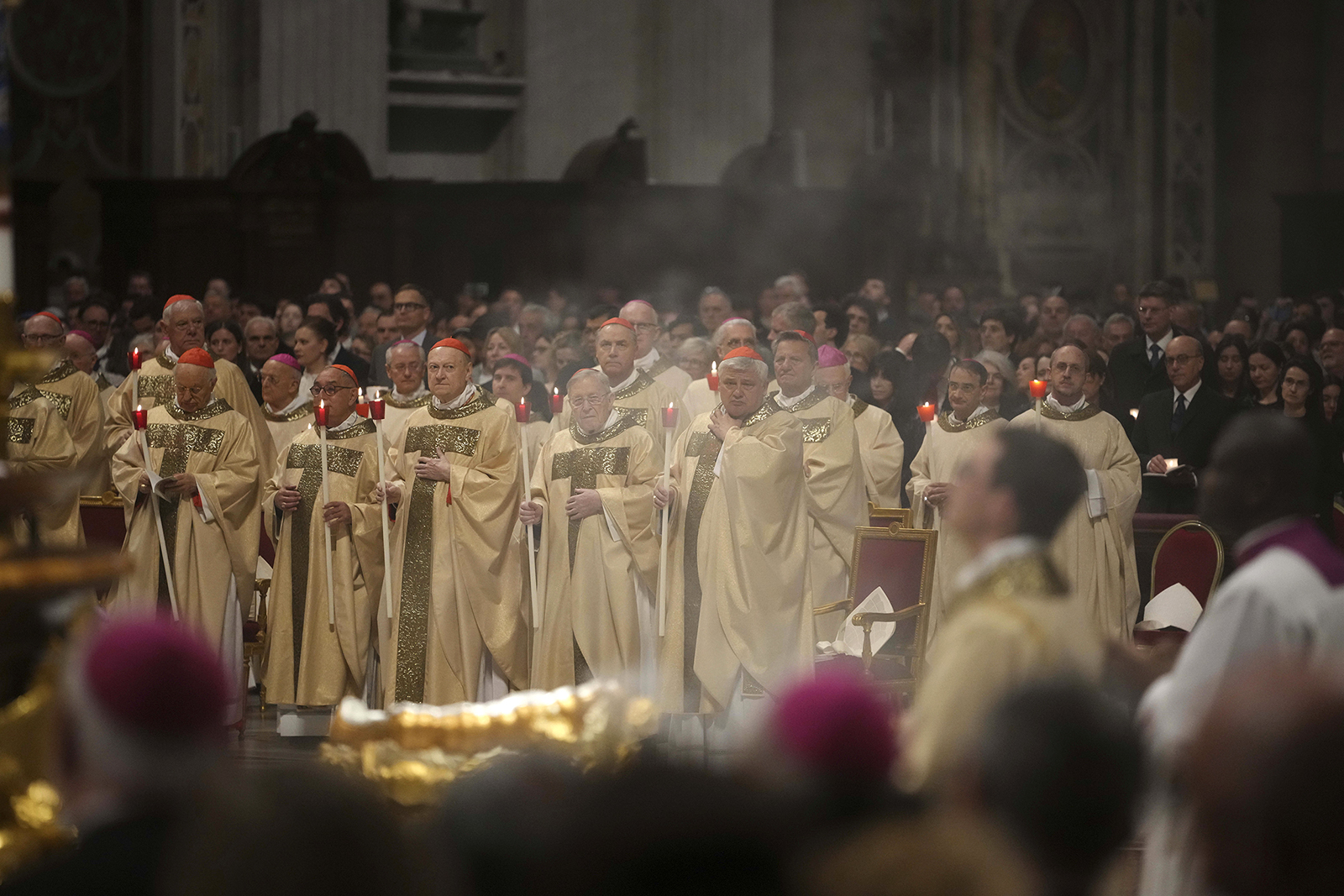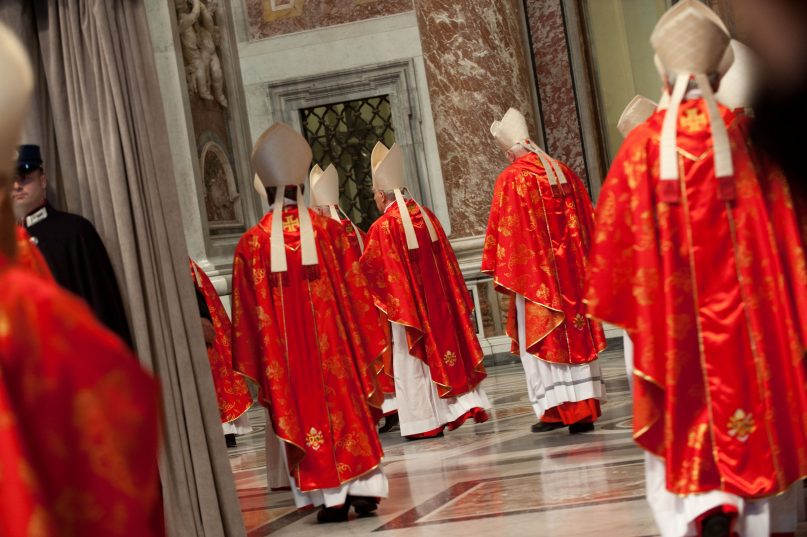
(RNS) — When a pope resigns or dies, church law mandates that cardinals gather in Rome within 15 to 20 days to elect a new pope. For serious reasons, the beginning of the conclave can be delayed an additional five days, but not longer. In the age of jet travel, this provides enough time for cardinals from all over the world to get to Rome, unless their government bars them from going.
Church prelates believe delaying the election could lead to uncertainty and confusion if the church is leaderless for a long period of time. In addition, a long delay could lead to greater conflict over the selection of the pope as factions get organized and begin campaigning for their favorite candidates.
The time before the conclave is not wasted. The cardinals do a lot of politicking in private at informal meetings and over dinners prior to the conclave.
With the death of the pope, all top Vatican officials lose their jobs, except Cardinal Kevin Farrell, the camerlengo, who is in charge of finances and ordinary administration during the interregnum. Cardinal Angelo De Donatis, the head of the Apostolic Penitentiary, a tribunal in charge of forgiving sins reserved to the pope, also remains in office so that forgiveness is always available. And the vicar for Rome, Cardinal Baldassare Reina, remains to provide pastoral care of the people of Rome.
Although overtly campaigning to be pope is discouraged and would be counterproductive, it is common for a cardinal to push his favorite candidate with the other cardinals. A cardinal can be a “king maker” if he is not a candidate but is trusted by the other cardinals.
In previous centuries, governments would try to influence the election. In the bad old days, cardinals’ lives could be threatened to force them to vote for a particular candidate. Votes could also be bought with money, but this does not happen today despite what was portrayed in the 2024 movie “Conclave.” Such actions would not invalidate an election, but church law states that a pope is not bound by any promise he may have made prior to his election.

Cardinals enter the Pro Eligendo Pontiface Mass prior to the conclave, March 12, 2013, at the Vatican. (RNS photo/Andrea Sabbadini)
What will cardinals look for when selecting a new pope? Each cardinal looks for three main things.
First, he looks for someone who would be a good pope — someone who agrees with the cardinal’s values and vision for the church. Like voters in other elections, a cardinal looks for someone who generally agrees with him.
Second, he looks for someone with whom he can have a good relationship. Ideally, he wants one of his cardinal friends as pope, someone who will listen to him. Personality and personal relationships matter, as do language skills.
Third, a cardinal wants someone who will be well-received in his home country, or at least someone who will not cause problems in the cardinal’s country. Unsurprisingly, cardinals from different parts of the world have different concerns regarding candidates.
For example, U.S. cardinals would not want a pope who does not understand the sex abuse crisis and says stupid things like “it is a creation of the media.” Nor do cardinals from countries with lots of Muslims want a pope who says stupid things about Islam. Cardinals from Africa would be suspicious of anyone with a “gay agenda.” Cardinals from the Global South are concerned about globalization. Cardinals from the north are concerned about ecumenism.
“All politics is local,” as Tip O’Neill said, and this includes the Catholic Church.
Current events can also impact the election. If the world is in turmoil, the cardinals might turn to an experienced diplomat who can act on the international stage. If the Vatican is broke or in the middle of a financial scandal, they may look for a financial manager and fundraiser.
Age and health are also criteria, depending on whether the cardinal wants a short or long pontificate.
Prior to the conclave, cardinals meet in what are called “general congregations” to prepare for the conclave and discuss the major issues facing the church.
Only cardinals under 80 years of age can attend a conclave, but all cardinals can attend the general congregations. In 2013, they met seven times over a period of five days.
At the early meetings of the general congregation, the cardinals review the rules for a conclave and take an oath to observe those rules and maintain the secrecy of the conclave. They also deal with the financial and logistical issues of the conclave and set a date for it to start.
The Vatican document governing conclaves, “Universi Dominici Gregis” (“Of the Lord’s Whole Flock”), also has the cardinals select “two ecclesiastics known for their sound doctrine, wisdom and moral authority” who will present to the cardinals two meditations on the problems facing the church and on “the need for careful discernment in choosing the new pope.” The first meditation is given before the conclave begins, while the second occurs right before the first vote.
Once these administrative issues are resolved, the cardinals talk about the state of the church.
Although speeches by cardinals in the general congregation are not campaign speeches, they do give the cardinals a chance to evaluate each speaker as a possible candidate. About 100 cardinals spoke in 2013, but Cardinal Jorge Mario Bergoglio stood out by succinctly summarizing the issues facing the church in less time than that taken by any other cardinal. While some cardinals ignored the time limit, Bergoglio finished early.
The 2013 discussions covered a wide range of topics: interreligious dialogue, ecumenism, collegiality, the Vatican Curia, church scandals and a desire for a more positive stress on love and mercy in evangelization. These became major themes of Pope Francis’ papacy.
The Vatican press office reported in general terms on the topics discussed in general congregations, but Italian newspapers reported the sessions in greater detail back in 2013. Even though the leaks undoubtedly came from Italian cardinals, the American cardinals were blamed and told to stop holding press conferences during this time. The Americans were silenced, and the Italian cardinals continued to leak.
With airlines able to get cardinals to Rome quickly, some have argued for beginning the conclave sooner. I think that would be a mistake. The cardinals, especially the newer ones, need time to get to know each other better and to exchange views. The time before the conclave is valuable for informal meetings and discussions, as well as for discussions in the general congregations. Electing a pope is too important an exercise to be rushed.
